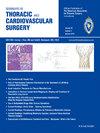从不和谐到对话:超越DEI的冲突转换框架。
IF 2.5
3区 医学
Q2 CARDIAC & CARDIOVASCULAR SYSTEMS
Seminars in Thoracic and Cardiovascular Surgery
Pub Date : 2025-09-15
DOI:10.1053/j.semtcvs.2025.08.005
引用次数: 0
摘要
女性,其他心胸外科和心胸麻醉中未被充分代表的身份及其盟友在改善心胸外科和心胸麻醉的多样性,公平性和包容性(DEI)方面取得了重大进展。然而,尽管这些努力取得了成功,但它们也遇到了阻力,这些阻力在病因和表达上都有所不同。缺乏专业协会、部门和部门对DEI阻力的正式分析,但可能导致几个重要的积极专业后果。当冲突得不到处理和管理时,它可能产生负面的文化影响,包括信任的侵蚀,并可能扩大个人和群体之间的疏远。这削弱了专业协会的力量和效力,削弱了亲和和专业支持的目标。另一方面,当专业团体以结构化或正式的方式探索有挑战或有争议的话题时,这个过程可能会产生相反的效果。正式对话可以减少有害的两极分化:它可以增加亲和力、专业支持和加强组织。冲突转型是在国际维持和平背景下制定的一个框架,可用于为参与围绕DEI的冲突提供理论依据和方法,包括最近禁止促进包容性或多样性工作的行政命令。具体来说,冲突转换——一个关系和以情境为中心的框架——可以帮助专业协会重新构建和导航围绕DEI的两极分化分歧。本文提出的策略旨在利用意识形态冲突作为增长的机会。改善围绕这些问题的讨论可能会提高专业协会的参与度,并加强同理心和相互尊重的文化。这可能是确保卓越和公平医疗的最佳途径。本文章由计算机程序翻译,如有差异,请以英文原文为准。
From Discord to Dialog: A Conflict Transformation Framework to Move Beyond Diversity, Equity and Inclusion.
求助全文
通过发布文献求助,成功后即可免费获取论文全文。
去求助
来源期刊

Seminars in Thoracic and Cardiovascular Surgery
Medicine-Pulmonary and Respiratory Medicine
CiteScore
5.80
自引率
0.00%
发文量
324
审稿时长
12 days
期刊介绍:
Seminars in Thoracic and Cardiovascular Surgery is devoted to providing a forum for cardiothoracic surgeons to disseminate and discuss important new information and to gain insight into unresolved areas of question in the specialty. Each issue presents readers with a selection of original peer-reviewed articles accompanied by editorial commentary from specialists in the field. In addition, readers are offered valuable invited articles: State of Views editorials and Current Readings highlighting the latest contributions on central or controversial issues. Another prized feature is expert roundtable discussions in which experts debate critical questions for cardiothoracic treatment and care. Seminars is an invitation-only publication that receives original submissions transferred ONLY from its sister publication, The Journal of Thoracic and Cardiovascular Surgery. As we continue to expand the reach of the Journal, we will explore the possibility of accepting unsolicited manuscripts in the future.
 求助内容:
求助内容: 应助结果提醒方式:
应助结果提醒方式:


